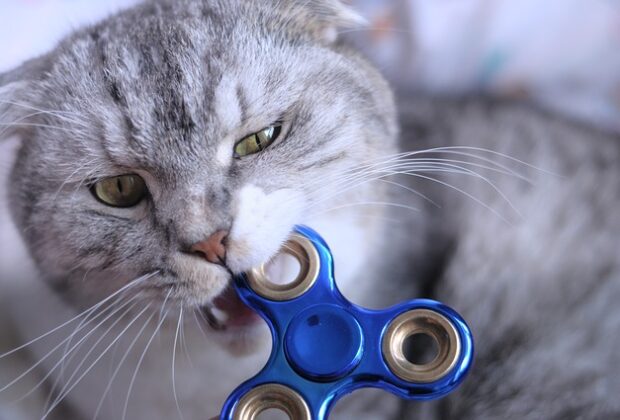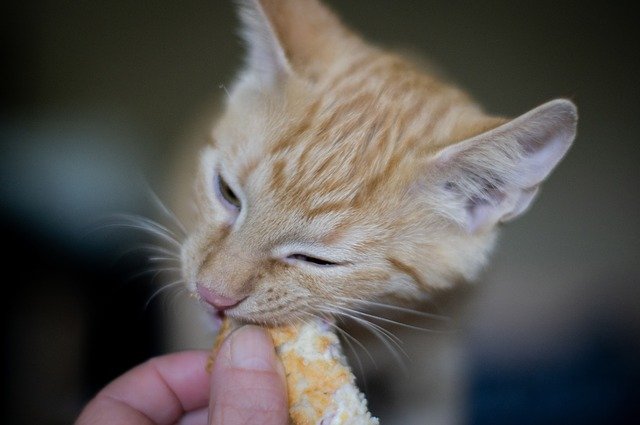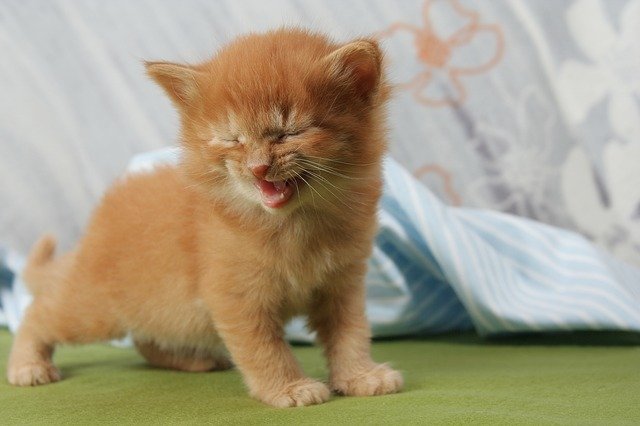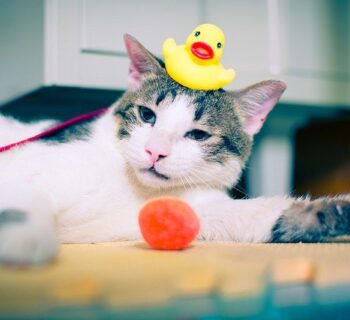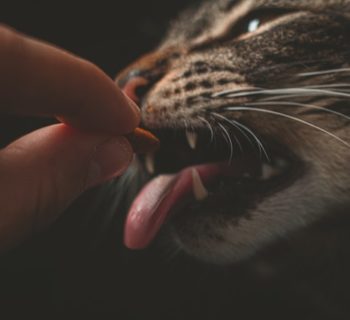Why does my cat purr and then bite me? If you're a cat owner, you probably have experienced this on occasion and wonder why they do so. We'll discuss all of the possible reasons your cat purrs and bites you in this article. Here, we'll also discuss steps you can take to manage purring and biting if being done excessively (the biting especially).
Table of Contents
Possible Reasons Why Your Cat Purrs and Then Bites
Some Felines Simply Don’t Like Being Petted
While some felines live for the petting they get from their humans, some do not like it as much as you would love them. So, if your cat starts biting when it is petted, understand that it may be one of the few felines that do not enjoy being stroked.
Cats Bite When They Feel Frightened, Threatened
Cats will bite when they feel threatened or afraid after trying to defend themselves to no avail. The threats could be from "simple" things such as being petted "excessively" or from a child lifting them. What you can do is let them go/tell the child to put the cat down at this point. When forced to remain in the same position, the biting can get worse.
Our felines may also bite if they are frightened about a situation. Cat mothers, for example, can quickly become aggressive if they feel their kittens are in danger from anyone. They may also be aggressive when in pain.
Overstimulated
As cats can become overstimulated from petting, they can become a bit aggressive and resort to biting if their more subtle clues are ignored or unnoticed. These clues include flattened ears, staring into space, swishing tail, and sometimes pupil dilation.
Some cats may even begin to lick their paws to redirect their aggression or sometimes walk away. Watch out for these signs to avoid the bite.
Here are some of the usual signs that your cat is overstimulated. Look out for these signs if your cat frequently bites during petting;
- Twitching fur
- Restlessness
- Flickering ears
- Dilated pupils or progressively larger eyes
- Tail swinging
- Back arching
- More tenseness on back
- Purring or meowing
Cat May Be Sick
If a friendly or welcoming cat suddenly becomes aggressive and then scratches or bites when touched, it might signify feeling unwell. Look out for other symptoms such as lethargy, vomiting, and diarrhea. If you suspect an underlying health condition from your observation, have the cat immediately checked by a vet for professional diagnosis and treatment.
Transfer of Aggression
Cats are highly territorial animals and are not very graceful with having other new pets or even people in their environment, especially when strangers compete for their owners' attention. So, you may wonder why the cat isn't aggressive to the person. Like humans, cats can transfer aggression if they know they can get away with it. A child, for example, may have had a bad at school but being unable to let out the frustration may come home to unleash on a parent or the pet. While the "receivers" did nothing to deserve the behavior, the pet is confident that it can easily get away with the behavior but unsure of what the "offender's" reaction will be like.
Cats may also be territorial and aggressive to you if they see you as their equal. They can get territorial over a person or even furniture in the home.
You Touched a Sore Spot
Cats may seem to be enjoying the petting, and then they suddenly bite for no apparent reason. While not obvious or visible, you may have touched a sore spot. Check the area, and if, upon a firm push or touch, you notice that your cat gets aggressive, it can be a sign that the area is sore/injured. In this case, seek urgent medical attention for it as soon as you can.
How To Prevent Cat Bites
Our felines will bite or scratch us at least a few times during their life, but this does not mean that you have to do nothing about the behavior. Biting should also not be a reason you become less gentle with the cat, as while the behavior is primarily automatic, you can manage it. The excessive biting is reduced with a few simple steps.
Know the common signs of overstimulation
Cats will usually let you know that they have had enough of the petting or holding. However, these signs are sometimes subtle, as you can easily miss such clues. Look out for the more obvious signs such as the ear flattening, the tail swinging, and a tensed back as you pet and stop if you observe any.
Know the right spots
Identify the spots your kitten likes being rubbed and spend more time on those. Cats like different places, so you have to figure out which areas are your cat's favorites and focus your time and effort on those areas.
Give your feline enough time to calm down
Avoid rushing to pet your cat again after it bites you. Cats need time to calm down, and you want to ensure that the signs of overstimulation have completely calmed before trying the petting again.
Also, remember that cats are different, and some will take longer to calm down than others. If you own multiple cats, be sure to really know them and how much time they need to calm down before starting the petting or holding again.
Reduce the petting time
Try to reduce the time you spend petting your cat, especially if it is new to you/new to the home. You want to know what your cat's limits are before spending too much time petting them and risking getting bitten. Some cats will do just fine on a few seconds of petting; for many, several minutes may be required.
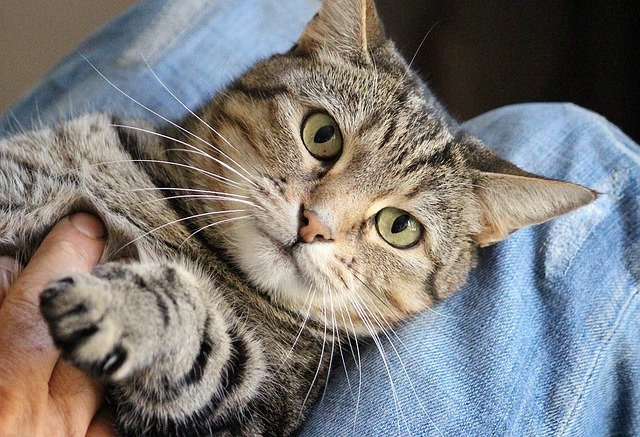
General Ways Cats How Their Affection
Here are some of the ways our cats can sometimes show that they love us. And while they don't seem like it or as energetic or obvious about it as canines, our felines can display their love in many funny and sometimes bizarre ways.
Purring
Purring is one of the most common ways our feline friends let us know they love us, and it's something they usually do when near us.
Grooming
Like they would with their offspring or siblings, cats can attempt to groom their humans as a sign of love and affection. When your cat licks you, it can indicate that they feel relaxed and trust you.
Belly up position
This is a vulnerable position, and cats will do it as a sign of love and let you know that they are happy to see you. They also do this because they trust and feel safe around you.
Head butts
Cats often show their affection and trust with head butts. It is also one of the common ways they let others know that they belong to you and, therefore, in their territory.
Slow blinks
When cats enjoy being around you, slow blinking is one of the ways they show it. It is one of the several ways your cat lets you know that it trusts and loves being around you. According to some cat experts, cats will know you love them too if you blink back slowly.
What To Do When Cats Purr And Bite You
While cat bites will not leave you bleeding or severely injured, it is still not something you want to handle without some form of caution.
Proper hygiene
When cats bite or scratch, you should wash it out immediately.
Cats spend time walking in and out of their litter boxes, and as expected, their paws step on the litter in the process. So, wash your hands with soap and water as often as your cat bites or scratches you.
Use more toys
Yes, you want to spend as much time as possible petting and cuddling your cat. However, the scratches and biting can mean that you won't always be able to do it. What you can do in this situation is make your playtime with it more toy-based. There are several toys for cats that will help keep them occupied, exercised while also being equally fun for both you and the cat.
Why Do Cats Purr and Bite You? Conclusion
Even though many of us enjoy petting our cats and having them purr as we do so, we sometimes get a different and unexpected outcome from the activity; bites and scratches.
Cats are different, and while not common, some cats simply do not enjoy petting! For the others, we discussed some of the reasons they may react the way they do when you pet them. We also discussed some of the subtle and not-so-subtle signs that your kitten may be getting tired of your petting, ways our felines show their affection, and some of the things you can do if your cat bites and scratches excessively.
That said, cats are great additions to any family, and while behaviors such as biting may be off-putting to some cat owners at times, they can be managed fairly well with the steps above.
About the Author
Kirsten Heggarty
Kirsten created The Pet Handbook with the aim of sharing her knowledge about pets, pet food, healthy habits, and more. All of her advice is based on years of her own experience with her pets, and feedback that she has received from grateful readers about her tips. If you want to know more please read the About Me page.

